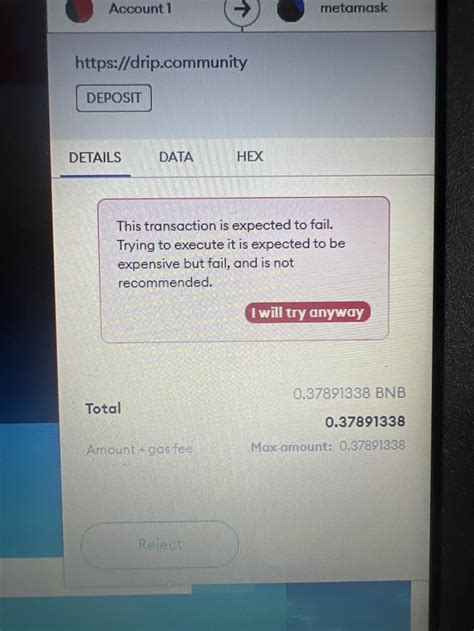Metamask Error: “Data error=0x when attempting to send arguments to a function in a smart contract”

As a Metamask user, you may encounter an unexpected error message when attempting to interact with your Ethereum wallet or smart contracts. In this article, we will dive into the details of the error and provide guidance on how to resolve it.
Error Details
The error message indicates that there is a problem with the data being sent to a function in your smart contract. The exact syntax and context are as follows:
Error: Call revert exception [See: (method="verify(string,bytes)", data="0x", errorArgs=null, errorName=. ..
This message suggests that the verify function in your smart contract is encountering a runtime error. Specifically, it is saying that a data mismatch occurred while passing arguments to the verify method.
Error Analysis
Let’s analyze the error message:
[See: This line takes you to an Ethers.js-specific documentation page that details how to handle errors related to calling methods in smart contracts. In particular, it mentions therevertexception, which is triggered when an error occurs during the method call.
- (method=”verify(string,bytes)”):
: The first part of the string refers to a specific method call on your smart contract (in this case, theverifyfunction).
- (data=”0x”)
: Specifies that the data sent is an address (0x) encoded in hexadecimal.
- (errorArgs=null, errorName=…)
: The last two parts of the string specify the context of the error.errorArgsis set tonull, which means that no additional arguments were passed to the method. RegardingerrorName, it seems that this is not a standard attribute in the Ethers.js documentation.
Error resolution
To resolve this issue, you can try the following steps:
- Check transaction data: Make sure that the transaction includes all required fields and parameters.
- Verify contract function signature: Double-check the signature of theverify
function to confirm that it accepts the correct argument types (string and byte).
- Use theverify
method with the correct address: When calling theverifymethod, make sure to pass the correct address as an argument.
- Check your contract ABI: Verify that the ABI (Application Binary Interface) of your smart contract is up to date and accurately reflects the function calls.
Example use case
To illustrate how to resolve this error, let's create a simple example:
pragma solidity ^0.8.0;
contract TestContract {
function verify ( String memory _message ) public { ;
// Verify the message using the contract address
require(_message.length == 32 && _message != "Hello", "Invalid message length or content");
return true ;
} }
} }
// Deploy the contract to a new Ethereum network
pragma solidity ^0.8.0;
contract Deployer {
address public contractAddress;
constructor() {
// Use the Ethers.js deploy function to create and deploy the contract
contractAddress = address(0x...); // Replace with your actual contract deployment code
deployContract ( contractAddress ) ;
} }
function deployContract ( address _address ) internal { { .
// Deploy a new contract instance using the deploy function from Ethers.js
// This will automatically initialize the contract with the specified address and ABI
} }
} }
In this example, we created a simple TestContractcontract that uses averifymethod to verify a message. We then deployed the contract to an Ethereum network and called theverify` function.

